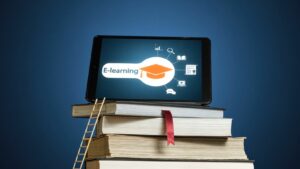From virtual classrooms to interactive learning platforms, the realm of educational technology is vast and ever-expanding. Researchers and developers in this field constantly strive to create solutions that cater to the evolving needs of educators and learners. By harnessing the power of technology, they aim to revolutionize traditional teaching paradigms and unlock new possibilities for personalized and effective learning experiences.
Educational Technology Research And Development
Emerging Technologies
 Educational technology development constantly explores emerging technologies to revolutionize the learning experience. Innovations like virtual reality, artificial intelligence, and blockchain are reshaping traditional teaching methods. Virtual reality immerses students in simulated environments, enhancing experiential learning. Artificial intelligence personalizes education by adapting content to individual student needs. Blockchain ensures secure and transparent record-keeping in educational processes.
Educational technology development constantly explores emerging technologies to revolutionize the learning experience. Innovations like virtual reality, artificial intelligence, and blockchain are reshaping traditional teaching methods. Virtual reality immerses students in simulated environments, enhancing experiential learning. Artificial intelligence personalizes education by adapting content to individual student needs. Blockchain ensures secure and transparent record-keeping in educational processes.
Global Impact Studies
Global impact studies analyze the effects of educational technology development worldwide. These studies investigate how technology integration affects academic performance, student engagement, and teacher effectiveness on a global scale. By examining data from diverse educational settings, researchers can identify best practices and trends to inform future developments in the field. The insights gained from global impact studies guide educators and policymakers in implementing effective technology-driven initiatives to enhance learning outcomes globally.
Key Theories and Frameworks in Educational Technology
Constructivism in Digital Learning
 Constructivism in digital learning emphasizes the active role of learners in building their understanding and knowledge through experiences. It posits that learners construct their knowledge by reflecting on their experiences, which are influenced by interactions with the environment. In the realm of educational technology, this theory proposes that technology should be used to create interactive and experiential learning environments that enable students to construct their knowledge actively. By engaging with digital tools and resources, students can explore, experiment, and build their understanding, fostering deeper learning and retention.
Constructivism in digital learning emphasizes the active role of learners in building their understanding and knowledge through experiences. It posits that learners construct their knowledge by reflecting on their experiences, which are influenced by interactions with the environment. In the realm of educational technology, this theory proposes that technology should be used to create interactive and experiential learning environments that enable students to construct their knowledge actively. By engaging with digital tools and resources, students can explore, experiment, and build their understanding, fostering deeper learning and retention.
Technology Integration Models
Technology integration models offer systematic approaches to incorporating technology into educational settings effectively. These models provide educators with frameworks and strategies to integrate technology seamlessly into teaching practices, enhancing student learning outcomes. Examples of technology integration models include the SAMR model, TPACK framework, and TPCK model. The SAMR model categorizes technology integration into four levels: Substitution, Augmentation, Modification, and Redefinition, guiding educators on progressively enhancing learning experiences through technology. The TPACK framework emphasizes the integration of Technological Pedagogical Content Knowledge to effectively teach using technology while considering content-specific pedagogical practices. Lastly, the TPCK model intertwines Technological Knowledge, Pedagogical Knowledge, and Content Knowledge to support teachers in designing technology-rich learning opportunities that align with curricular goals. By implementing these technology integration models, educators can optimize the use of educational technology to enrich teaching and learning experiences.
Methodologies in Education Technology Research
Building on the foundation of technological influence on education, the methodologies employed in educational technology research are diverse and impactful. Two primary approaches shape this field: quantitative and qualitative methodologies.
Quantitative Versus Qualitative Approaches
 In educational technology research, quantitative methods involve the collection of numerical data and statistics to analyze the effectiveness of tech-based teaching strategies. Researchers quantify variables to measure the outcomes of specific interventions, providing valuable insights into the impact of technology on learning outcomes. On the other hand, qualitative approaches focus on gathering non-numerical data to gain a deeper understanding of the complexities associated with technology integration in education. Qualitative research methods, such as interviews, observations, and case studies, help researchers explore the nuances of student experiences and educator practices in tech-enhanced learning environments.
In educational technology research, quantitative methods involve the collection of numerical data and statistics to analyze the effectiveness of tech-based teaching strategies. Researchers quantify variables to measure the outcomes of specific interventions, providing valuable insights into the impact of technology on learning outcomes. On the other hand, qualitative approaches focus on gathering non-numerical data to gain a deeper understanding of the complexities associated with technology integration in education. Qualitative research methods, such as interviews, observations, and case studies, help researchers explore the nuances of student experiences and educator practices in tech-enhanced learning environments.
Case Studies and Meta-Analyses
Case studies play a crucial role in educational technology research by offering detailed examinations of real-world scenarios where technology is integrated into teaching and learning processes. These in-depth investigations provide valuable context and insights into the practical application of educational technology tools, highlighting successful implementations and potential challenges. Meta-analyses in educational technology research involve the statistical synthesis of findings from multiple studies to identify patterns, trends, and discrepancies in research outcomes. By aggregating data from various sources, meta-analyses offer comprehensive overviews of the effectiveness of different educational technology interventions, guiding future research directions and policy decisions in the field.

